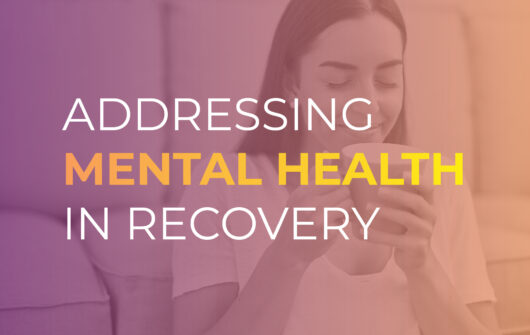Addressing Mental Health in Recovery
Posted on: August 30, 2024

Substance use and mental health disorders are closely connected. According to the National Institute of Mental Health, many people who struggle with substance use also face significant mental health challenges. In fact, research shows that nearly half of individuals with a substance use disorder also have a co-occurring mental health disorder. This is shown to also be true for our residents at Caz Recovery, where 63% of them in 2023 were living with co-occurring disorders. In this month’s newsletter, we explore how our programs address these dual challenges, supporting residents as they work toward sustainable recovery. To help bring these insights to life, we’re spotlighting two of our dedicated Counselors; Dominique Rodriguez, LMSW, and Erin Haley, LMHC-P, who work closely with our residents. Their perspectives offer a deeper look into how we approach mental health in recovery at Caz.
The Complex Relationship between Substance Use and Mental Health
The relationship between substance use and mental health disorders is multi-faceted. For some, untreated mental health issues—like depression, anxiety, ADHD, or trauma—can lead to substance use as a way to cope or self-medicate so they can manage their mental health symptoms easier. For others, substance use itself can trigger or worsen existing mental health conditions. The National Institute on Drug Abuse highlights that shared risk factors, such as genetic vulnerabilities and environmental stressors, contribute to the development of both substance use and mental health disorders. At Caz, we recognize that both issues must be treated simultaneously for long-term success. Our Rehabilitation programs integrate mental health care into substance use treatment, while our Reintegration programs focus on supporting each individual by maintaining the appropriate outpatient linkages that ensure our residents receive comprehensive support tailored to their unique needs.
Erin Haley, LMHC-P at Madonna House, emphasizes the importance of understanding this relationship: “Untreated mental health is kind of what leads to the substance use. Many residents come to us not realizing how much past trauma or unresolved emotional pain has impacted their path to addiction.” explains Erin, who has a deep commitment to addressing mental health issues as a root cause of substance use. She continues, “It’s about being emotionally stuck in a place where you can’t get out on your own, and that’s where temporary releases like substances come into play.”

Erin Haley, LMHC-P; Counselor Madonna House
Caz’s Approach to Co-Occurring Disorders
Our approach begins with a thorough assessment of each resident’s mental health and substance use history. This helps us identify co-occurring disorders early in the recovery process. From there, we develop individualized treatment plans that address both mental health conditions and substance use disorders, allowing residents to work on both aspects of their well-being simultaneously. Dominique Rodriguez, LMSW at Turning Point House, highlights the critical role of trauma-informed care: “Substance use issues aren’t really about the substances themselves—it’s about what happened in a person’s life that led them to use in the first place. By addressing that underlying trauma, we give residents a chance to truly heal.” Dominique’s work focuses on helping residents build resilience and learn strategies that address the roots of their struggles.

Dominique Rodriguez, LMSW; Counselor Turning Point House
Building Effective Coping Strategies
Developing strong coping skills is a cornerstone of our treatment programs. For residents with co-occurring disorders, managing both mental health symptoms and substance use cravings can be overwhelming. Erin and Dominique explained that at Caz, we teach numerous coping strategies, including mindfulness, positive affirmations, and practical self-care routines, to help residents navigate their daily challenges in healthier ways. Erin shares her perspective on the importance of personalized care: “In individual sessions, we focus on understanding what each resident needs to feel grounded and in control. Whether it’s mindfulness exercises or building self-confidence, it’s all about equipping them with the tools to manage their triggers and emotions.” Dominique adds, “A lot of our residents have never been taught how to cope with their emotions in healthy ways. By introducing positive coping mechanisms, we help them replace the old, destructive patterns with ones that support their recovery.”
Other Recent Posts
Your donation can save a life!
In the grip of the opioid epidemic, you can make a difference. Any amount helps.





